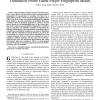61 search results - page 6 / 13 » Modeling Software Evolution with Game Theory |
119
click to vote
FSTTCS
2000
Springer
15 years 5 months ago
2000
Springer
We present a framework for decision making under uncertainty where the priorities of the alternatives can depend on the situation at hand. We design a logic-programming language, D...
111
Voted
IUI
2003
ACM
15 years 7 months ago
2003
ACM
We present a probabilistic model, based on Dynamic Decision Networks, to assess user affect from possible causes of emotional arousal. The model relies on the OCC cognitive theory...
112
Voted
TCIAIG
2010
14 years 8 months ago
2010
Abstract--Fingerprinting operators generate functional signatures of game players and are useful for their automated analysis independent of representation or encoding. The theory ...
122
click to vote
ATAL
2009
Springer
14 years 11 months ago
2009
Springer
Today's society is largely connected and many real life applications lend themselves to be modeled as multi-agent systems. Although such systems as well as their models are d...
111
Voted
ATAL
2010
Springer
15 years 3 months ago
2010
Springer
Multi-agent learning is a crucial method to control or find solutions for systems, in which more than one entity needs to be adaptive. In today's interconnected world, such s...


